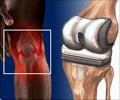Patients receiving interleukin-1£] (IL-1£]) inhibitors found to have significantly lower rates of total hip or total knee replacements.

‘Combined incidence rates for total hip or total knew replacements were 40 to 47 percent lower with canakinumab treatment.’
Read More..




In the CANTOS trial, more than 10,000 patients with elevated high-sensitivity C-reactive protein (hs-CRP) levels and a history of myocardial infarction were randomly assigned canakinumab or placebo injections every 3 months for up to 5 years to determine the cardiovascular effects.Read More..
Cardiovascular event rates fell among participants receiving a higher dose range of canakinumab, with the greatest magnitude of effect accruing among those with the most robust reductions in hs-CRP and IL-6. CANTOS, therefore, provided the researchers with a unique opportunity to explore the effects of IL-1£] -targeted therapy versus placebo on incidence rates of total hip or total knee replacement surgeries.
In their analysis, researchers from the Novartis Institutes for BioMedical Research (NIBR), University of Leeds and Brigham and Women's Hospital, Harvard Medical School found that the combined incidence rates for total hip or total knew replacements were 40 to 47 percent lower with canakinumab treatment, with all canakinumab doses reducing the number of joint replacements similarly.
The reduction in joint replacements among patients who received canakinumab versus the placebo group became apparent after only one year of treatment and remained statistically significant when CANTOS participants with a history of crystalline or inflammatory arthritis were excluded.
However, the authors provide a cautionary note that the number of women in the trial was relatively low, while knee osteoarthritis is a disease that predominates in older women.
Advertisement
The authors also note that joint replacement is a robust endpoint and one that might be adapted by the U.S. Food and Drug Administration for evaluating disease-modifying osteoarthritis drugs.
Advertisement
Source-Eurekalert












